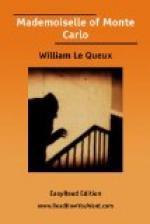“To prevent you from learning the truth.”
“She was on the point of telling me what I wanted to know.”
“Exactly. And what more likely than someone outside, realizing that Mademoiselle was about to make a disclosure, fired at you.”
“But you said that Mademoiselle had enemies.”
“So she has. But I think my theory is the correct one,” replied the girl. “What was it that you asked her to reveal to you?”
“Well,” he replied, after a brief hesitation, “my father died mysteriously in London some time ago, and I have reason to believe that she knows the truth concerning the sad affair.”
“Where did it happen?”
“My father was found in the early morning lying in a doorway in Albemarle Street, close to Piccadilly. The only wound found was a slight scratch in the palm of the hand. The police constable at first thought he was intoxicated, but the doctor, on being called, declared that my father was suffering from poison. He was at once taken to St. George’s Hospital, but an hour later he died without recovering consciousness.”
“And what was your father’s name?” asked Lisette in a strangely altered voice.
“Henfrey.”
“Henfrey!” gasped the girl, starting up at mention of the name. “Henfrey! And—and are—you—his son?”
“Yes,” replied Hugh. “Why? You know about the affair, mademoiselle! Tell me all you know,” he cried. “I—the son of the dead man—have a right to demand the truth.”
“Henfrey!” repeated the girl hoarsely in a state of intense agitation. “Monsieur Henfrey! And—and to think that I am here—with you—his son! Ah! forgive me!” she gasped. “I—I——Let us return.”
“But you shall tell me the truth!” cried Hugh excitedly. “You know it! You cannot deny that you know it!”
All, however, he could get from her were the words:
“You—Monsieur Henfrey’s son! Surely Il Passero does not know this!”
ELEVENTH CHAPTER
MORE ABOUT THE SPARROW
A month of weary anxiety and nervous tension had gone by.
Yvonne Ferad had slowly struggled back to health, but the injury to the brain had, alas! seriously upset the balance of her mind. Three of the greatest French specialists upon mental diseases had seen her and expressed little hope of her ever regaining her reason.
It was a sad affair which the police of Monaco had, by dint of much bribery and the telling of many untruths, successfully kept out of the newspapers.
The evening after Hugh’s disappearance, Monsieur Ogier had called upon Dorise Ranscomb—her mother happily being away at the Rooms at the time. In one of the sitting-rooms of the hotel the official of police closely questioned the girl, but she, of course made pretense of complete ignorance. Naturally Ogier was annoyed at being unable to obtain the slightest information, and after being very rude, he told the girl the charge against her lover and then left the hotel in undisguised anger.




